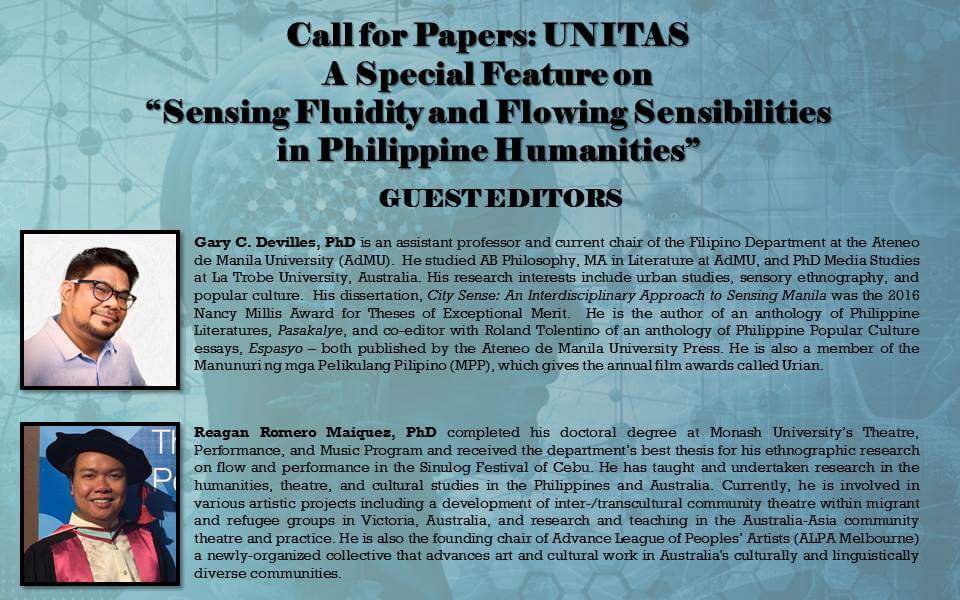UNITAS Special Feature on “Sensing Fluidity and Flowing Sensibilities in Philippine Humanities”
UNITAS Special Feature on “Sensing Fluidity and Flowing Sensibilities in Philippine Humanities”
Guest Editors: Gary C. Devilles and Reagan R. Maiquez
The history of senses and emotions is an established and vibrant research field within cultural history which has brought new theoretical and methodological issues to the fore of historical and cultural analysis. Key scholars like David Howes, Constance Classen, and Melissa Gregg have turned their attention toward the ways that ongoing political, economic, and cultural transformations are changing the realm of the social. Jane Bennett argues that political theory need to do a better job of recognizing the active participation of nonhuman forces in events, the “vital materiality” that runs through and across bodies, both human and nonhuman. William Connolly says that creative human freedom is never simply about the artist but rather that which “flows” through and between agents.
This issue of UNITAS will look into a range of perspectives and themes in the history of senses and emotions, new materialism, and creative human freedom. We invite papers and research essays in Philippine Humanities, Arts, Creative and Critical Studies, Natural Sciences, Sociology, Anthropology, and Psychology that explore traditional analyses of representations and discourses and the shift towards newer emphases on practices, materiality and historical phenomenology. We welcome critical reviews of “Pantayong Pananaw” as forerunners of this “affective turn,” since the methodology of Zeus Salazar, Prospero Covar and Virgilio Enriquez employed critical vocabularies of affect and inner body experience, as the later practitioners have shifted from cognition and emotional codes to affective dispositions and practices rooted in the body. Amaryllis Torres, for instance, has worked on the notion of “Pakapa-kapa” (literally groping in the dark) as a method of interviewing in Filipino Psychology.
Contributors are invited to think of their relationship to the world beyond the phenomenological, reflecting and refracting the planetary, the outer space, time or temporal regimes, as well as micro-events, politics, or even the sensorial functions that negate a human central nervous system. To be taken up are questions on sensory studies, “affective turn,” “vibrant matter,” fluidity and flow studies in this special issue.
The following broad subtopics are suggested as themes and not limitations:
– Emotional communities and regimes
– Emotional practices and vocabularies
– Embodiment, performance and emotional styles
– The politics of emotions
– Emotions, senses and material objects
– Emotions and senses in religion
– Gender, class and age
– Space and place
– Sight and sound
– Shame and disgust
– Desire and sexuality
– Emotions and senses in literature and philosophy
– Emotions and senses in medicine, health and healing
– Emotions and senses in popular culture
– Theoretical and methodological issues of senses, emotions and the affective turn in the Philippines or Filipino culture (Pantayong Pananaw)
– Mobility, flow, and liquid modernity in Filipino cultural studies
– Application of actor-network theories in Filipino pop culture
– Performativity of things, objects, and non-human actors/actants
– Animality, the wild, human-animal interaction, ecological theatres
– Networks, archipelagos, island-continental relationalities
– Non-representationalism and perception and cognition
– Time, temporality, and historical non-materialism
– Geohumanities, place as culture and the culture of place
Send your contributions or inquiries to gdevilles@ateneo.edu

